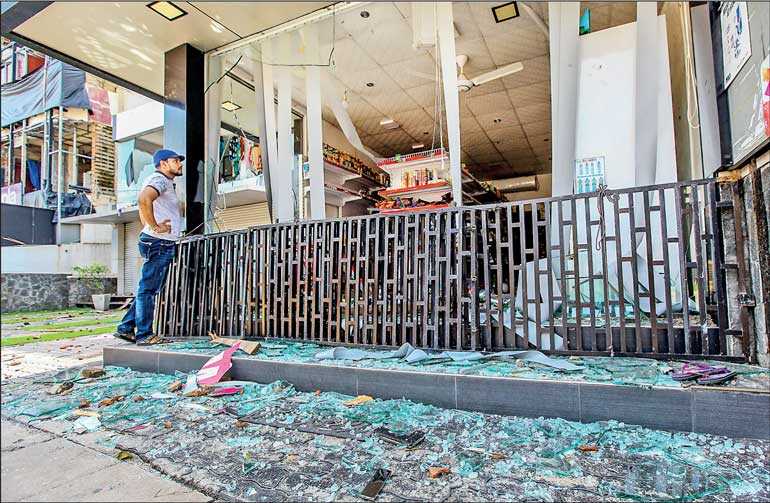Thursday Feb 19, 2026
Thursday Feb 19, 2026
Friday, 24 May 2019 00:00 - - {{hitsCtrl.values.hits}}

The Easter Sunday attacks perpetrated by suicide bombers and their associates created a climate of fear all around the country. It is highly distressing that the entire Muslim population in Sri Lanka is under siege and subject to enormous challenges to conduct their day-to-day affairs.
Every morning is dawned with stories of harassment and attacks inflicted on the Muslims by majority communities, whether they are Christians or Buddhists. The tardiness and inefficiencies of the armed forces and the Police in controlling attacks on the Muslims, their properties and mosques are seen by the victims as a deliberate act of connivance. 
Muslims are vetted everywhere, whether it’s public or private institutions, treated with excessive suspicion and looked upon as suspects or potential suicide bomber. The author recalls his own experience as to how the private security guards stationed at the entrance of Nawaloka and Apollo private hospitals in Colombo, backed up by hospital staff, behaved like the Government forces vested with powers under the Emergency Act.
The author further recalls being outside Majestic City where visitors were asked to write their names and addresses before going through the frisking process. Though it all looked indiscriminate, the very purpose of the process implied the presence of deteriorating communal relationship and increasing inequalities.
Mob violence
Amidst the recent wave of violence, one begins to realise the cynicism for which Sri Lanka now finds itself: once capable of defeating one of the most ruthless terrorist organisations in the world, now struggling to coherently explain why it failed in protecting its citizens, not only by not acting on the intelligence received prior to the Easter Sunday attacks, but also when innocent Muslims face persecution by organised mob violence, emboldened enough to play judge jury and executioner.
Malcolm Cardinal Ranjith shone out of the darkness of this distressing time as a beacon to those who were shocked, awed and avowing avenge. His message subsided the wave of retaliation and reassured hope in humanity despite inhuman acts of the terrorists against his own community. Despite all this, the Muslim minority in the country was targeted at Negombo and Chilawweeks after in a coordinated manner. The racial hatred spewed by Sinhalese extreme elements took over the forefront of the attacks against the Muslims as though they were lurking in the shadows.
Following the Easter Sunday atrocities, the unnerving calm that prevailed for almost a week seemed to foreshadow the hidden danger of violence, until attacks on Muslims were unleashed by the Christians in Chilaw.
On 5 May – despitethe curfew – anarmed mob attacked the Muslim village Poruthota in Negombo, resulting in many houses being robbed and destroyed, with shops and vehicles being torched. Despite the determination of State forces in their pursuit of confiscating even kitchen knives and arresting the Muslim household for keeping them, the unruly Sinhalese mob were able to wield their sinister weapons, hell-bent on damaging as many houses, vehicles and personal belongings of the Muslims they could. The mishandling of the intelligence is as intrinsically evil as the attacks and the counter attacks on an ethnic group which in every aspect disassociated with the perpetrators of such a heinous crime.
As usual, the security forces attempted to control the violence only after all the damage and robberies had been effectively carried out by the mobs. This reactive approach, instead of proactive meant that mob attacks on Muslims spread across the country in numerous places: Bingiriya, Hettipola, Kuliyapitiya, Dummalasuriya, Kobeiganai, Nikkaravettiya, Minuvangoda and Panduwasnuwara, to name but a few. It is reported that 23 mosques and an Arabic college were vandalised in Kurunegala District and 27 mosques and an Arabic college were destroyed in Gampaha and PuttalamDistricts.
The curfew is conveniently being used as a ruse to carry out attacks on the Muslims, who confined to their homes, make for an easy target. It is unfortunate that the Muslims have always been at the receiving end of abuse, harassment and humiliation at the hands of the Buddhist extremists since the end of the LTTE in 2009.
One cannot phrase the context of Sinhalese violence against the Muslims more appropriately than the Mayor of ColomboRosy Senanayake, who put it succinctly: “Sinhalese terrorism has risen through violence.” Once again Army Commander Major General Mahesh Senanayake shamefully acknowledged his inefficiency, stating that the mob attacks were well coordinated.
It is unsurprising then that the President, the Commander in Chief of the Armed Forces, who greedily absorbed the Ministry of Law and Order to his remit in 2018, demonstrated competency in neither. Law and order became parochial and usurping when his party General Secretary (SLFP) hadbailed out four Sinhalese suspects who had been arrested by the Police following the violence against Muslims in Kurunegala, much to the glee of the cheering crowd. What a sorry state the country is in when a MP so brazenly undermines law and order, legitimising mob violence.
Sri Lanka’s history of terrorism
Sri Lanka’s history of terrorism is multifaceted, and the phenomenon of terrorism surfaced with the JVP’s first insurrection in 1971. Though short lived and conveniently forgotten, Tamil terrorism preceded Sinhala Terrorism, and the consistent and sporadic acts of terror by the LTTE eventually consolidated the Temporary Terrorism law into a permanent Statute in 1982, which also engulfed the acts of terrorism perpetrated by the JVP. The JVP was referred to a terrorist organisation in Sri Lanka until it was crushed and its members joined the mainstream democratic politics.
Attacks on 13 Sri Lankan Army by the LTTE at Tirunelveli in July 1983 led to retaliatory attacks on the innocent Tamils in the South of the country by the Sinhalese mobs, allegedly with the support of the then Government in power(UNP), killing over 2,000 innocent Tamils and destroying their properties.
As philosopher George Santayana said, “Those who do not learn history are doomed to repeat it,” yet it seems that even for a blood-soaked island like Sri Lanka, the Sinhalese extremists appear to have not learnt any lesson all through history and instead seek an ill-fated niche in the organism of racial supremacy. It is incontrovertible that retaliatory action cannot be described just merely a crime against humanity but as a terrorist act for all intents and purposes.
Since independence, Sri Lanka has witnessed heinous acts of terrorism, perpetrated by those identifying with distinctive groups; Sinhalese (JVP), who fought against the Sri Lankan Government on political ideology; Tamils (LTTE), who fought for territorial separation; and of late, the ISIS whose purpose is unknown.
The LTTE has historically targeted Buddhist temples and monks: ambushing Buddhists monks at Arandalawa in June 1987, killing 33 of them, at DaladaMaligawa in Kandy in June 1998 killing 17 worshippers, in an attack on Jaya Sri Maha Bodhi killing around 146 pilgrims, a suicide bombing of a Buddhist temple in Batticaloa during celebrations of the Vesak killing 23 people.
It seems disproportionate then, that the Muslims, who are being persecuted for the actions of a handful of individuals on churches and hotels, and who have repeatedly condemned and rejected IS, have found themselves at the receiving end of a brutal backlash at the hands of an angry Buddhist mob.
Sacrificial lambs
Since the 1983 July attacks on Tamils, Sri Lanka became a pariah state, taking several decades to rebuild its image by preventing further attacks on Tamils despite provocation by the LTTE. Their reign of terror lasted almost three decades around all of Sri Lanka, even touching India until its final defeat in 2009, and yet almost a decade later, the LTTE has revitalised its support and fundraising amongst the ill-informed youth of the Tamil diaspora.
Though the modus operandi of the group responsible for the Easter Sunday attacks bear the hallmark of global terrorism, ISIS, a politicised terror group, is condemned and rejected by Muslims, who have no association with such a transnational terror outfits to the extent of inflated numbers and threats posed by the media and the government of Sri Lanka.
It is in this context, that the majority of Muslims will serve as a sacrificial lambs led to the slaughter by the Government as recompense for their own security lapses and incompetence.
Malcolm Cardinal Ranjith reflected upon the tragedy with calm and caution but vented his anger at the government throwing his curse on the politicians who failed to prevent the tragedy. It is in this background the leaders of the Muslim community unreservedly admitted shame on behalf of the community for the heinous crimes committed allegedly by a few individuals in the name of Islam, thus self-crucifying themselves for the sins of those responsible.
Muslims far and wide became targets and suffered heavy losses as a result of the inefficiency of the Government which failed both in preventing the Easter Sunday attacks and in subsequently protecting the Muslims being attacked by the vengeful Sinhalese mobs.
The enemy of my enemy is my friend
During the time of civil war in Sri Lanka, Muslims joined all three forces and contributed immensely to the intelligence service in the civil war against the LTTE, who terrorised both the Sinhalese and the Muslims. Admiral Ravindra Wijegunaratne puts it gratefully that “We are alive today because of the Muslim military officers.”
The armed forces have conveniently forgotten the Muslims as lifesavers but rushed to designate them as terrorists and tend to associate with the former LTTE “terrorists” to hunt down the Muslim “terrorists”. It is much more distressing to note that an NGO headed by JehanPerera pointed out in his statement that “It is reported that the security forces are enlisting the services of former LTTE cadres in the north and east to assist them in supporting the security network. This speaks of the Government’s commitment to reconciliation and the trust that has grown after a decade of peace.”
What this really means is that the LTTE, which expelled hundreds of Muslims from the north and killed them in hundreds in the east, now collaborate with their erstwhile enemies, the Sri Lankan armed forces, to hunt down the Muslim “terrorists” in the north and the east.
It is an opportune moment for the LTTE to seize the opportunity to settle their old scores with the Muslims like their Tamil politicians who now perceive Muslims as the only terrorists in the world, despite their own shameful backing and endorsement of the LTTE.
It is ironic that the armed forces have turned to their former enemies to reconcile with the Tamils at the cost of their friends who have saved their lives. The Muslims have lost faith in both major communities and find themselves between the devil and the deep blue sea.
As Sri Lanka enters its second decade since the civil war, it requires leadership from individuals who recognise that without genuine ambition for unity, Sri Lanka will once again succumb to unnecessary bloodshed.
(The writer can be reached via [email protected].)